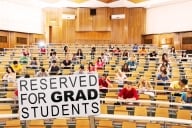You have /5 articles left.
Sign up for a free account or log in.

Istockphoto.com/Tuangtong
LONG BEACH, Calif. -- If you park at no charge in the university lot in front of your campus office, you might be sticking your employer with a tax bill without even knowing it.
Or maybe you ride public transportation to work at an urban college. You purchase your metro pass using money from your paycheck that's routed to a pretax account instead of your taxed paycheck. You also might be unknowingly leaving your employer holding a new tax bill.
Colleges and universities are facing possible new tax bills like these, plus a dizzying number of questions about how and when they should be calculated, in the wake of the Republican tax-reform package signed into law at the end of last year. Even seven months after President Trump etched his signature onto the bill, institutions have little guidance on what, specifically, they will be paying.
The uncertainty was clear Sunday at the National Association of College and University Business Officers annual meeting. A tax update session seemed to raise more questions than answers about a host of issues, including unrelated business income taxes on employee parking, transit benefits and the sections of the new tax code covering them.
Experts made clear that colleges aren't blaming employees for tax law changes they couldn't control. Still, they warned that under some interpretations, universities might have to pay taxes on employee parking benefits even if they don't charge anyone to park in lots at all. They worry the law will be interpreted to say that employers have to pay taxes on the amount they spend to maintain one of their parking lots where they reserve spaces for employees -- like money paid to pave or plow.
Some colleges and universities might be able to dodge taxes on pretax transit programs by no longer offering such programs to employees. But that's not going to be possible for institutions in jurisdictions like New York City, where local laws require the pretax transit set-asides be offered.
So the situation could turn out to be expensive for institutions with a large number of commuter lots or many employees who ride the bus to work. It remains hard to say just how expensive, though, because the federal government is offering little in the way of guidance on how, exactly, to calculate the value of the benefits to be taxed in nuanced situations.
What if students pay for parking but employees do not? Do institutions that pay to pave and plow employee parking lots but charge no one to park in those lots indeed have to pay taxes on the upkeep? How do you calculate the value of parking to be taxed if a university charges off-campus vendors more to park on campus than it charges its own employees? What about a university that provides bulk funding to a local transit system under a payment-in-lieu-of-taxes agreement?
The issue of taxing nonprofit employees' parking benefits has received some attention recently after Politico reported in June that churches and other nonprofits would have to begin paying a 21 percent tax on such fringe benefits under the new tax law. Republicans used the new law to restrict fringe benefits that for-profit companies have used for tax deductions. Reasoning that they wanted to treat nonprofits equally but are unable to remove deductions for employers that already pay no tax, they added the new tax on certain employee benefits.
No guidance on the nonprofit issues is expected to come from the Internal Revenue Service any time soon, said Liz Clark, NACUBO's federal affairs director. That leaves colleges and their lawyers flipping through sections of the new law largely on their own.
“Are they not deductible under 274 and a part of 512(a)7, and therefore they should not be included?” Clark said, citing numerical provisions in the tax code. “If you understand what I said, then God bless you. The bottom line is there are debates about the pretax, there are debates about the parking expenses.”
The questions aren't just around fringe benefits. Numerous issues stem from a 21 percent tax on compensation for university employees making more than $1 million, which is nicknamed the Nick Saban tax after the highly paid University of Alabama football coach.
It's clear private institutions fall under the tax, but it's not entirely clear which public institutions are subject to it. Public colleges and universities are organized differently from state to state. Some are clearly set up as governmental units. Others fall into a gray area.
“For those that are very clearly a governmental unit, we believe this tax as currently written does not apply to you, but for others, this does indeed apply,” Clark said. “The lawmakers on Capitol Hill believe it applies to all of you. It was their intent.
“Intent and the letter of the law are two different things,” Clark continued. “We understand that there are tax writers that very clearly want to make sure that this applies to all governmental units and schools that consider themselves governmental units.”
The tax covers employees who were among an institution's five highest paid in the last year, plus anyone who was covered in years prior. So an institution could already have more than five people on its list.
“That's where it gets really sticky,” said Julia Shanahan, executive director of tax for Columbia University. “You're calculating who your first covered employees were starting in 2017, even though the tax doesn't kick in until a later date.”
An exception exists for medical services -- many universities own hospital systems and have to be able to pay doctors high wages. But experts are scratching their heads when it comes to how the tax works in the case of a doctor who is also a faculty member. Does the exception count only for the pay earned while the doctor performs surgery?
The accounting issues seem to cascade endlessly. Lawmakers could move to clean up some of the issues by passing a technical corrections package. But such a fix-it bill seems unlikely to go anywhere before November's midterm election.
That leaves colleges doing the best they can.
“We still have a lot of questions about how all of this is going to work,” said Anne Jetmundsen, tax adviser for the University of South Florida.








